Some are hot, some are cold. And a special look at employment in oil & gas drilling and in mining.
By Wolf Richter for WOLF STREET.
in the jobs data for December on Friday, we saw what we’d expect from an economy that is plugging along just fine, and we saw that wage increases have been reheating again for the past few months, despite the Fed’s 5.5% policy rates. But not every industry is in the same boat. In some industries, employment hit new highs, according to data by the Bureau of labor Statistics. In others, such as Information, employment had dropped sharply since mid-2022 but started picking up again in recent months. And in other industries, employment is on a long-term decline because of structural changes. And then there are the jobs in federal, state, and local governments that we’ll take a closer look at.
The month-to-month changes are expressed in three-month moving averages (3MMA) which iron out the monthly squiggles that are just noise.
The categories are by work location. The surveys are sent to business facilities by address. The primary activity at that facility is what determines the category. Just to illustrate: A worker at an Amazon fulfillment center counts under “transportation and warehousing”; a driver operating out of an Amazon delivery center also counts as “transportation and warehousing”; a worker at an office of Amazon’s AWS division would count under “Professional and business services”; a worker at a location that deals with the retail aspects of Amazon’s business would count under “Retail”; a worker at an office that primarily works on the software aspects of Amazon’s ecommerce business might count under “Information.”
The private sector.
Construction, all types of construction, from single-family housing to highways. Employment has been rising to new all-time highs for two years. The construction industry also has a record number of job openings.
- Total employment: 8.06 million, new all-time high
- 3MMA growth: +17,000
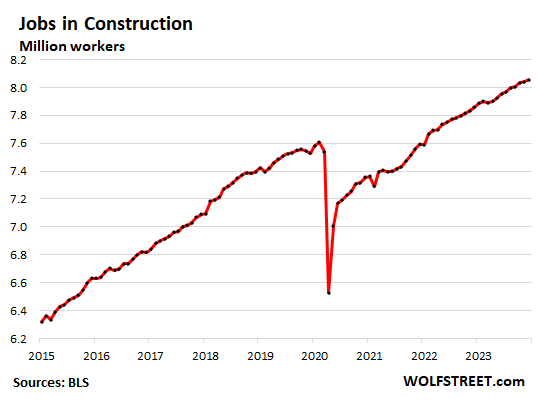
Oil & Gas Extraction is a fun one. First a word about the boom in fracking that we at Wolf Street have followed with fascination since our beginning in 2011.
US become the largest oil and gas producer in the world. Due to the boom in fracking, first natural gas production has grown from all-time high to all-time high, turning the US into the largest natural gas producer in the world, and exporting large quantities via LNG terminals and pipelines.
Then oil production has grown from all-time high to all-time high, turning the US into the largest oil producer in the world. The US has become a net exporter of petroleum and petroleum products.
Constant and relentless technical innovation, driven by the terrible economics of early fracking, have made fracking vastly more productive and more cost-efficient – including labor costs. So here we go.
Employment in oil & gas extraction are the people who actually work out in the oil field, not the engineers, coders, specialists, lawyers, administrators, etc. in offices and other facilities. And so employment in the oil field has dropped due to technical innovation despite the historic boom in oil and gas production, and the number of people actually working in the oil field has become small:
- Total employment: 119,000
- 3MMA: +0
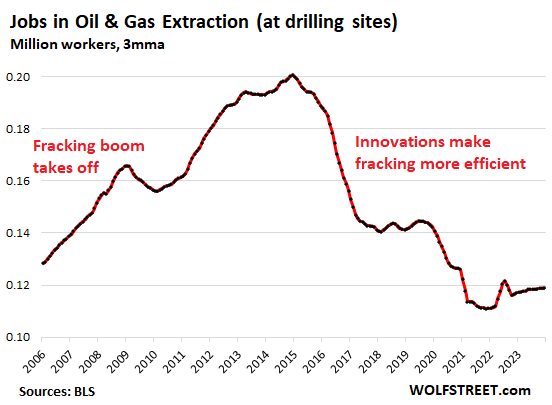
Mining, excluding oil & gas: There also have been innovation and automation. But coal mining descended into mayhem when the price of natural gas collapsed in 2009 due to the fracking boom.
In terms of coal mining, roughly two-thirds of production comes from surface mines, and one-third from underground mines (EIA data). Total production peaked in 2008. By 2009, the nascent fracking boom caused the price of natural gas to collapse, and together with combined-cycle natural gas powerplants with thermal efficiencies of over 60%, natural gas become far cheaper to generate electricity with than coal. Power generators dispatched more generation to their natural gas plants, and built combined-cycle natural gas plants while retiring old coal plants in large numbers. In recent years, the falling costs of wind and solar power have caused power generators to shift more generation away from coal, and demand for coal for power generation has plunged.
From 2008 through 2020, coal production plunged by 54%. But in 2021 and 2022, coal production increased by 11% on increased exports, driven by metallurgical coal.
In the overall mining sector, in all types of mines and quarries, employment has sharply increased from the low point in 2020. But since 2008, employment is still down by 17%.
- Total employment: 188,000 – highest since late 2019.
- 3MMA 1,000
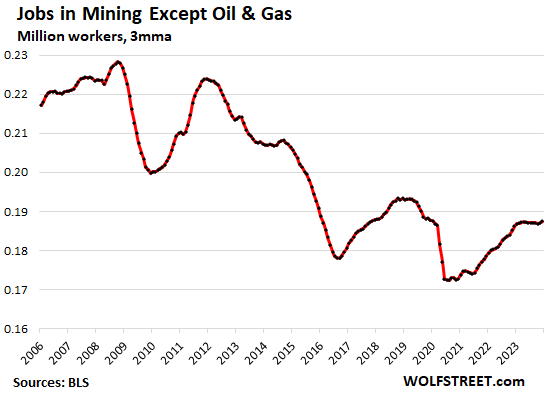
Healthcare and social assistance:
- Total employment: 21.9 million, new all-time high
- 3MMA: +74,000
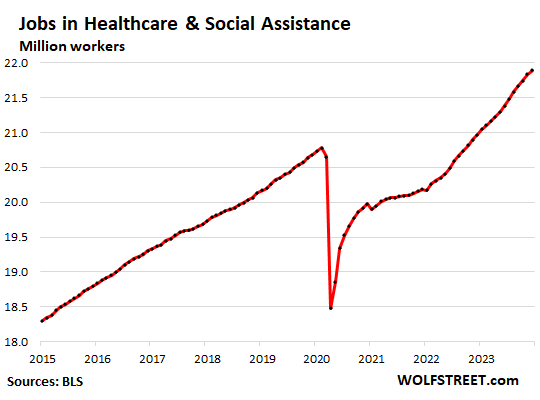
Manufacturing: Employment has plateaued all year, except during the strikes in the auto industry in October, when employment dipped, and then recovered back to the plateau.
- Total employment: 13.0 million
- 3MMA: -2,000
- 6MMA: +1,000
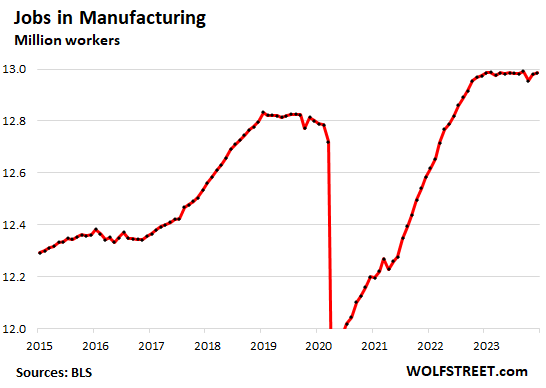
Wholesale Trade:
- Total employment: 6.1 million, new all-time high
- 3MMA: +6,000

Arts, Entertainment, and Recreation includes spectator sports, performing arts, amusement, gambling, recreation, museums, historical sites, and similar:
- Total employment: 2.5 million, new all-time high
- 3MMA growth: +11,000
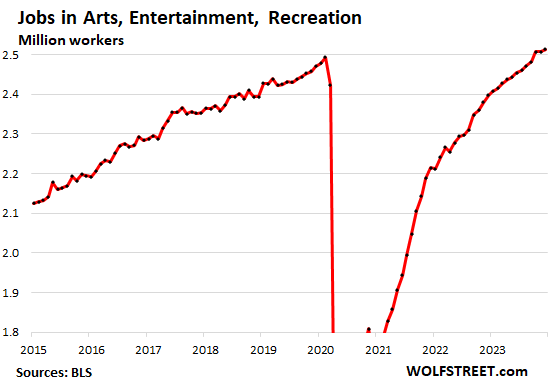
Financial activities (finance and insurance plus real estate renting, leasing, buying, selling, and management). Employment peaked in August and September and since then tapered off just a tad.
Employment in mortgage lending has taken a massive hit since 2021 when mortgage rates began to rise and refi volume, a big part of the business, collapsed and purchase-mortgage volume plunged.
- Total employment: 9.15 million
- 3-MMA growth: -2,000
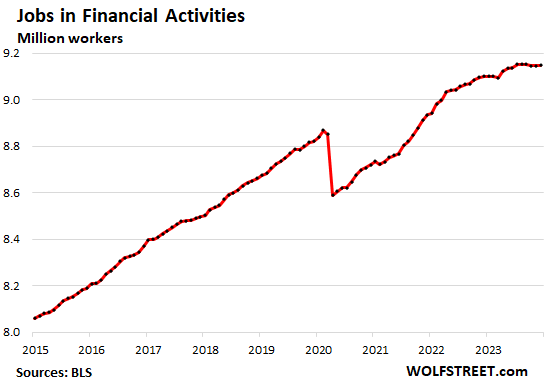
Leisure and hospitality – restaurants, lodging, resorts, etc.
- Total employment: 16.8 million, almost back to pre-pandemic levels.
- 3MMA growth: +26,000
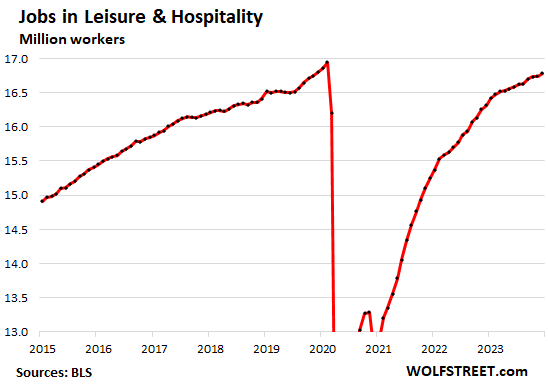
“Information,” a small sector that includes work sites by some of the tech and social media companies. Other tech company work sites are included in Professional and business services (below), or other categories.
Information includes facilities where people primarily work on web search portals, data processing, data transmission, information services, software publishing, motion picture and sound recording, broadcasting including over the Internet, and telecommunications.
- Total employment: 3.05 million
- 3MMA growth: +6,000
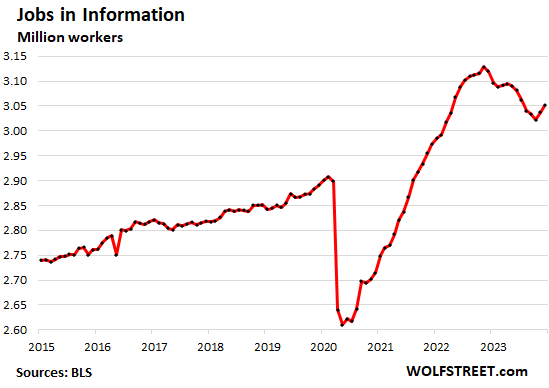
Professional and business services. Largest sector by employment. It includes facilities of some tech and social media companies; others are in “Information” (above) or in other categories.
The category includes facilities whose employees work primarily in Professional, Scientific, and Technical Services; Management of Companies and Enterprises; Administrative and Support, and Waste Management and Remediation Services.
- Total employment: 22.95 million
- 3MMA growth: -11,000
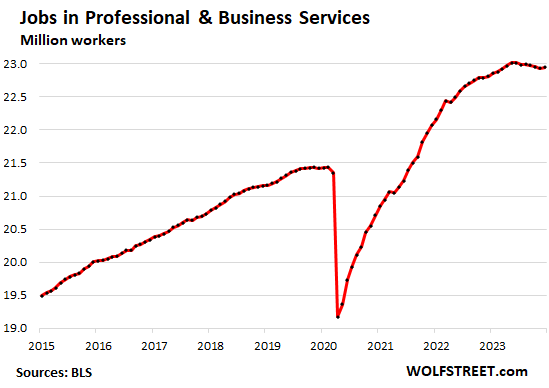
Retail trade includes workers at brick-and-mortar retail stores – malls, auto dealers, grocery stores, gas stations, etc. – and other retail locations such as markets. It does not include the tech-related jobs of ecommerce operations, drivers, and warehouse employees. A big portion of this sector has been under heavy pressure from ecommerce operations:
- Total employment: 15.5 million
- 3MMA growth: +3,000
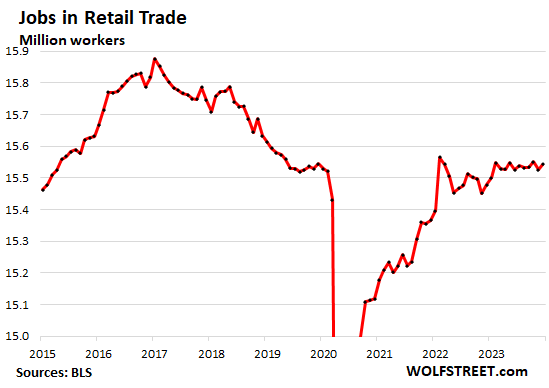
Transportation and Warehousing: You can see the decline after the huge boom in 2021 and 2022:
- Total employment: 6.6 million
- 3MMA growth: -19,000
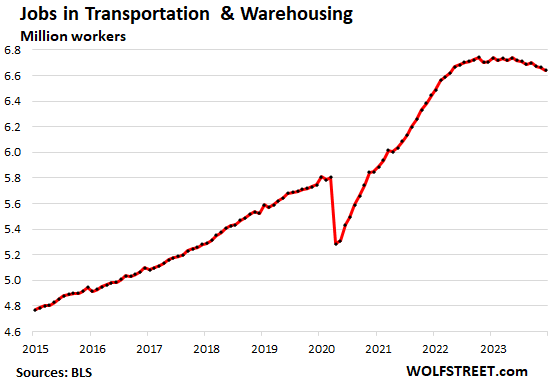
Jobs in government.
First, we’re going to look at total government jobs – federal, state, and local – as a percent of total employment. Some things to note:
- Spikes occur every 10 years in federal employment when the census is taken.
- When total employment collapsed in early 2020, government employment did not collapse as much, and the percentage of government jobs to the collapsed total jobs spiked briefly.
- A majority of local government jobs and a portion of state jobs are in education, from preschool to state universities, and include community colleges, trade schools, etc.
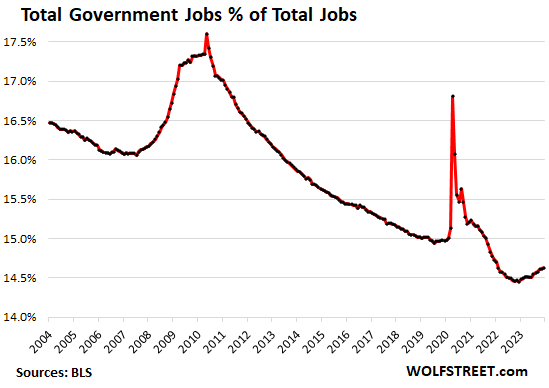
Federal government civilian employment: the spikes occur every 10 years when the census is taken.
- Total civilian employment: 2.96 million
- 3MMA growth: +5,000
Federal employment as percent of total employment (1.9% in December):
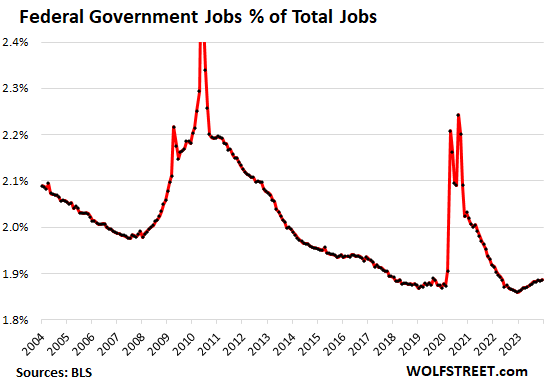
Federal employment in millions of employees:
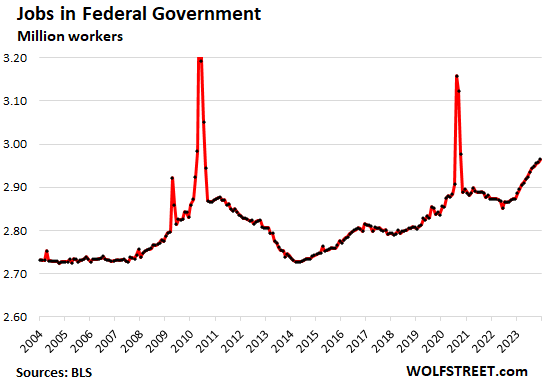
State governments (includes education, such as at state universities).
- Total employment: 5.3 million
- 3MMA: +13,000
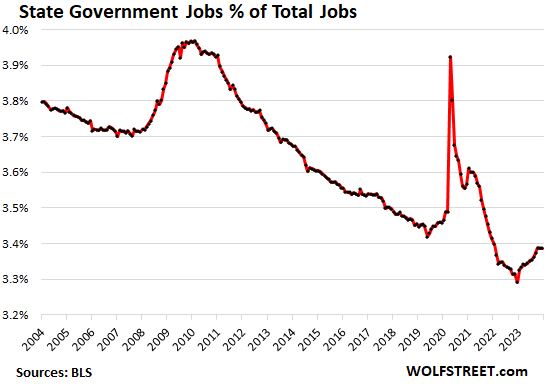
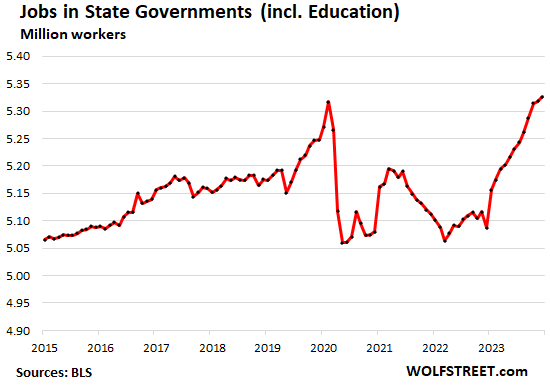
Local governments – employment is dominated by education. After the lockdowns of schools, districts struggled with large-scale teacher shortages. Employment is finally back where it had been before the pandemic.
- Total employment: 14.7 million
- 3MMA growth: +32,000
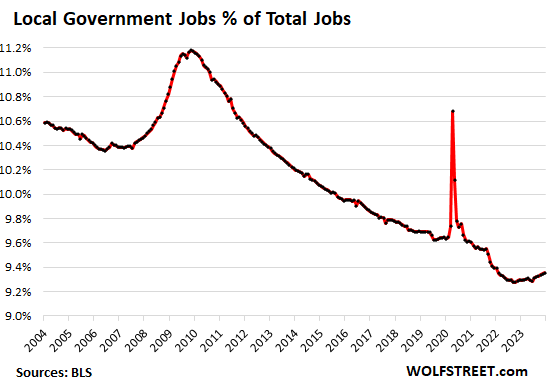
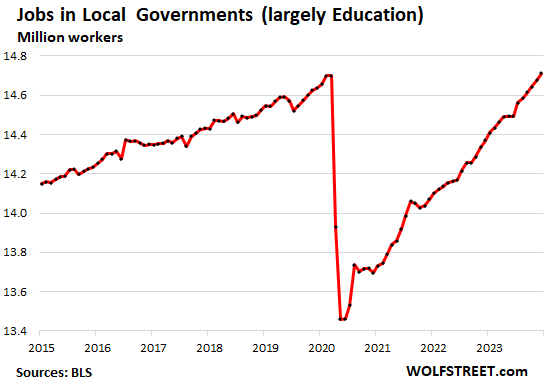
Enjoy reading WOLF STREET and want to support it? You can donate. I appreciate it immensely. Click on the mug to find out how:
![]()


It appears that mortgages, tech industries and the e-commerce warehouses took a hit in tandem with higher interest rates, but December 2023 added jobs amounted to about 200,000+ new jobs.
Meanwhile, in Canada, we achieved a whooping 100 jobs in December 2023 despite high population growth (1 million new people a year since 2022). 100 jobs. America= 200,000+ jobs, Canada 100 jobs.
So no job growth in Big Tech companies but valuations od the “ungrounded 7” jumped by 75% causing Nasdaq to jump by 45%. And we are not even talking about 3 day work week (aka hybrid work).
I’ve said many times that stonks and cryptos are designed to enrich the top, while retail investors hodl the bag.
I remember my friend at uni having his bank send a letter closing his student account because he attempted to buy some bitcorn when it was at a few hundred a few years ago.
Now the banks want you to buy high and sell low on the bitcorn all of a sudden when it’s at all time highs.
Gen Z – I’m guessing you’re considerably younger then I am (I’m 45). I worked in housing/construction from 94 to 2013 – and 2013 up to present in the mining sector. I never, ever in my wildest dreams thought that a modest 1200 square foot bungalow out in the country would list and sell for over $500,000 (cdn) and it would become common. I also work with Canadians from practically every province currently. The level of poverty, homelessness, and tent towns/cities is unbelievable. I don’t want to sound alarmist – but never in my life (or my mother’s- she’s 65) have we ever witnessed this level of downtrodden people – and it’s all over. Before alot of this was more isolated to BC (milder, warmer climate); now, I’m hearing first hand reliable stories from PEI, New Brunswick, towns all over the place in Canada. And the desperate attempts to shelter many refugees in Toronto- there’s something really, really wrong. Is the government this idiotic? Are they trying to manufacture some crisis to try and come to the rescue? I really don’t know.
It appears to be that there’s a bunch of sociopaths in Canada with vested self-interests to profit from a housing crisis and profiteering from global food inflation by raising prices higher and higher.
Halifax used to have small town prices for housing; now rents there are as high as Toronto.
Getting Rent-to-Income geared housing takes decades to get these days, and will only get worse as the Canadian population increases unnaturally while every month Canada loses full time jobs, and gains a few net part-time jobs.
100 jobs gained last month…in all of Canada. Population reached the 40 million milestone in July. Now it’s almost at 41 million people in a few months.
How will people pay the high rents in the future?
And then Canada found out what it’s like to be a Newfoundlander. Yes, b’y.
Look at how many potential buyers are balking at condo offers. I agree that getting rental inventory up will take years. Wolf had an article pointing out German housing. New builds cost a minimal amount; reduce square footage, cheaper materials, etc. It still costs. Existing housing had and is able to depreciate more. There’s a number of parties that can be blamed for the current bubble (OSFI, fomo buyers, speculators, provincial tenant boards, etc.). It seems the federal government is so far paying lip service to high prices – 2024 should be interesting to see if they try to slacken up consumer mortgage requirements- we shall see (2025 election year at the latest).
All completely expected with the economic system. One would have thought food security, education, shelter, healthcare and employment would have been priorities for any society.
Since Scrappy mentions doing construction during GFC1… if we could extend that construction graph back to 1990 we’d see that we’re on the other side of a massive valley (or rollercoaster), well above 2008 levels.
Anyone got an educated thought on that? Wolf?
Rates are down. So RE is going up. Can we get another RE update soon? Historic low inventory, low prices, now lower rates…..RE to the moon – soooon?
This really clears up all of the doom and gloom over the payroll data where some folks were pointing out the amount of government jobs that have been making up the data. At the end of the day the percent of government jobs (federal and local) are not even near decade highs as a percentage of total jobs even with the recent ramp up in federal government jobs.
Many private colleges keep closing doors which often move their students into existing private or public colleges. Personally I feel like higher education shall continue to struggle with current demographic outlook. Many universities have remote distance learning options, which opens up the pool, but at the same time since most of them are doing it they are all competing with one another. They need a baby boom asap or mass immigration of future students. As more private higher education close their doors, public higher education is the alternative. Definitely a sector to keep an eye on.
Or maybe people are figuring out that the price of college doesn’t pencil….. most of the young ‘uns know someone who is up to their lips in college debt, which is negatively impacting their ability to start a family, buy a house, and save for their future. There can be no baby boom without babies.
I think it’s a combination of the number of high school graduates is shrinking and the job market is great.
Bingo. I would not recommend that any young person go directly to college right now. Go learn a trade first. What ever you do… do *not* take on debt to pay for school.
My son tried college and withdrew after ~3 weeks. Best decision ever. Worked for Discount Tire for 15 months until he figured out he would not make it on $14.75/hour. I told him I’d pay for him to get a CDL. He drove for ~3 years. Netting around $115k/year. (Had to get a loan from him to pay my property taxes a couple of years ago. lol) Then he decided to go to lineman school. He’s working construction now and waiting for a call out to start his apprenticeship.
The way he’s saving he’ll have no debt, and a net worth of about $150k in 4 years.
College/University are just not going to pay back for the majority of people given the cost. My opinion.
Or travel overseas and teach English as a 2nd language. Fantastic opportunity to see much of the world and while not living large economically you are expanding your awareness. Plus it can lead to other opportunities if you really enjoy it, especially if you already speak multiple languages.
It boils down to lifestyle choices. A college degree of any kind reduces the chances of unemployment for the average person willing to jump through those hoops and a degree delivers on average over 1M of additional income before retirement or death, whichever comes first!
Happiness and contentment on the other hand appear to be unrelated to wealth in my personal experience.
Wolf, typo on number of working in oil and gas just above the graph. Total employment =119,000.
Thanks
I wonder how job satisfaction is faring in America.
I recall reading a statistic that close to 75% of people don’t like their jobs. Life is about more than material possessions. It’s also about whether you enjoy what you’re doing, or not.
My father, who is now retired, was a nuclear engineer for long decades. When I asked him how he enjoyed his job on a scale of 1 to 10, he said “Eight.” That’s pretty damn good — plus he’s a bit jaded, a bit of a cynic, so that should be taken into account.
The various sectors of the economy, I’m sure, having different average job satisfaction rates. I’m sure the Information Sector of coders is more satisfying than working in the fracking oil fields. But then again, who can tell? Maybe some people like being outdoors.
“I’m sure the Information Sector of coders is more satisfying than working in the fracking oil fields.”
You need to talk to some people who actually work on drilling rigs. It can be tough physical work, but it’s also very challenging, and to a lot of guys very satisfying, one of the ultimate he-man jobs, but there are now some women doing it too, and they’re just as tough.
Ain’t that the truth. I’ve spent all of my 20s looking out a windshield of a truck and hating 95% of it. If not more. I quit a job recently and am taking a good few months away from trucking. Seeing the jobs data here and the employment opportunities in my local job market, I might be exiting the trucking world entirely. I’m dreading going back. But starting over in a different job market and taking the ensuing pay cut is a very tough pill to swallow.
Roll the dice, start over and set myself back financially a tremendous amount. Or keep on stacking cash in food service trucking making nearly 100k and hating every waking minute of life and destroying my body. Tough call.
I’m always envious of our European counterparts in regards to work. Working to live rather than living to work. Some other industries I have some experience in all run 12 hour days, lots of overtime, and many are swing shifts. Not to mention the low starting pay. And mediocre senior pay.
“Roll the dice, start over…”
Chimp ‘n Temp staffing agency, perhaps?
Good luck Trucker Guy, it takes courage to change career. Biden is creating a lot of good and high paying jobs in semiconductor manufacturing, they need a lot of manpower in operations, you might check it out. For example, see story like https://www.npr.org/2023/12/19/1219830288/biden-semiconductor-chips-workforce-jobs.
Use the trial and error method to find the right career for you. Everyone is different and so If you hate driving a truck then that probably means you have abilities that are not being put to good use, use training programs and courses at local community colleges to assist your quest and do not be afraid to take 2 steps backward and retrain so you can take 3 or 4 steps forward. I have done this about three times during my career but it all worked out. You only weakness is that you want an easy (European) job that lets you live a great life in tandem with your career, Newsflash… all significant success in a career comes with dedication, focus, dependability, constant personal development and perseverance through difficult time, no job is perfect and so try to aim for a job that hits 80% of what you like to do and just do the other 20% of the job as a “necessary evil”, like taking out the trash at home and cleaning the kitchen and bathrooms. Good luck, I have had about 20 different jobs and succeeded in about half of them. Look at failure and the way to learn what not to do and move on, Good luck,
That’s a false equivalency though. Wanting to make a middle class wage in a career and not a mcjob, say 60k a year or more, and then also not work 60 hours a week isn’t asking for much. It used to be a standard in the US to work 40 hours a week and support a family and normal life on just that one income.
Good luck doing that now. It’s quite difficult to make it nowadays in a normal blue collar job or trade on your own. It’s to the point of needing two incomes just to afford a small “cheap” house. Hence why I’m doing the crappiest form of trucking to rake in the money. Or why a lot of guys do the crappiest form of their trade. Such as oilfield/underwater welding as opposed to factory welding or job shop deals.
It’s corporate brainwashing to accept the declining standard of living for the workers in the US and the collapsing of the middle class. I’m so beyond sick of hearing low level worker bees beat on their chest that working your life away is the only way.
It doesn’t make anyone more of a man to work 16 hours a day, 7 days a week for pennies. It makes you a chump for the elites. Don’t be proud of this fact. Being a productive hard worker is one thing. But giving up a standard of living your parents and grandparents had; and then parroting propaganda about slaving away for less makes is idiotic.
And don’t take this as me being some layabout slacker. I’ve averaged 55+ hours a week for years. Many weeks working over 75 hours. I can’t even tell you the last time I had any fun or joy in life. To be completely honest, I’ve grown to hate existence. I’ve been an inhuman machine chasing money nonstop since I was 20 years old. I’ve been the guy jumping out of trailers to save a few seconds of time and jogging in and out of places with a pallet jack to get a stop done faster. I can honestly say, I’ve never met someone who has outworked me at a job. And I’m not bragging or coming here saying that I’m better than anyone else or that everyone else is some slacker clock-milker. I need pills to sleep, my blood pressure is 160+ often, and I’ll need surgery for my back and arms in another few years. And it’s downright stupid to do what I’ve done. Yes, I’ve reaped some rewards for my insane work ethic. But being a worker like that for a company and not yourself is just bullshit. What I’ve made and earned doesn’t reflect the misery it took. I’m still not rich. I still don’t have a paid for house. I don’t have a massive retirement account that’ll let me hang it up at 40.
I absolutely loathe to see people recommend to everyone to just work harder and you’ll make it. Hustle culture is a cancer and if you actually do like a lot of people half heartedly endorse, you’ll barely get ahead and suffer 100x more than the mediocre average guy. It’s just not worth it and it just makes you a stooge for corporate America that would love to bring back full on slavery.
Right on Trucker Guy. Well said.
My son tried trucking, but the hours and the traffic on the I-5 corridor burned him out.
Trucker Guy,
You seem like a nice dude, but good lord man… Are you planning to go on and on and on about how downtrodden you are and how much you hate trucking forever? If you hate your current conditions so much, then change them!
“It used to be a standard in the US to work 40 hours a week and support a family”
It depends on where you live and what work you pursue. Maybe you can’t afford the house you want and life you want in a high priced area, but if you are indeed making near $100k and stacking cash, then save up and move! I did. There are lots of affordable places to live all over the country. My wife and I were getting nowhere with the high costs around L.A. even though we brought in good money by most people’s standards. So we moved to Albuquerque where we are very comfortable on just my income @40-50hrs/wk. We comfortably bought a house in the nice part of town with the best schools and my wife can focus on being around for our 5yr old son. No chance we could do that in CA so easily. Plus the people are way nicer here and I haven’t been in a proper traffic jam for like a year. It’s great! Wasn’t easy, but well worth it.
Or, if you insist on staying where you are…. I guarantee you can afford to stay. Maybe not in the house or neighborhood you *think* you deserve, and maybe not with work conditions that you love. But those are tradeoffs you need to accept. Or you can change nothing and keep complaining about how the fed, and your employer, and the system has mistreated you over the coming decades and remain miserable while the rest of the world marches on and leaves you behind.
Damn’d good, Trucker Guy.
“I’m sure the Information Sector of coders is more satisfying than working in the fracking oil fields.”
I dunno, in college I was really good at coding, but I honestly hated it.
These days my FT employment is an office job, but my side hustle involves a good amount of physical labor and working with my hands… and I find that a lot more satisfying than the office job.
To each his own.
The problem with coding jobs is management and marketing doesn’t code and over promises clients and demands the impossible. See AI…
Said perfectly!!!
I don’t doubt that – but personally I just can’t stand staring at a computer screen all day. I’m too restless for that.
Eh, lot of job satisfaction imo isn’t what the work is about, it’s how it’s organized to be done. For example, I don’t like my current job at all, but love the field and tasks itself. The reason I don’t like it is because the schedule is too rigid and workloads (particularly on weekends) usually get to be too high and you end up burned out after a shift. It’s like chocolate. I love it, but not when I’m required to eat it in 9-10 hour shifts non-stop with no breaks and in very high quantities. That’s why I’m changing jobs to a slower pace with more schedule flexibility.
I left a job sitting in a comfy cubicle to work a more physical job climbing towers and buildings. Way more job satisfaction.
Similar to the guy in Office Space, when he left his cubicle world to work construction.
I don’t now but I took a decade “off” to live overseas and teach. I say off because not exactly putting money in bank like they say you should do during your 30s! Life changing however. Back to income right now however.
“I’m sure the Information Sector of coders is more satisfying than working in the fracking oil fields.”
I worked in IT for over 4 decades.
I kept at it until I was unable to solve what turned out to be a very simple problem.
I enjoyed it because most of my time – when not in seemingly endless meetings – was spent “solving puzzles”. As soon as I was unable to do that I retired.
So I was very satisfied.
But I can’t compare myself to workers in ANY other occupation because I never was in one.
anon – your last sentence should be embraced and pondered by many more than it is…
may we all find a better day.
Are these stats corrected? My understanding is that a number of such stats are often corrected down after several months.
All data here are always the latest revised data going back to Adam and Eve.
What did you think? That I just add the current month and leave all other data alone? How stupid do you think I am?
Woof
We absolutely need more employees in oil and gas because everybody is just being stretched to their limit which makes the work worse and makes it harder to recruit.
On top of that places like Midland are determined to not be welcoming to families (you can look up an oped from the CEO of Diamondback on the topic).
Several years ago (I’m now retired), when I was in the oil business, there was nowhere to live in Midland/Odessa. Houses and apartments had waiting lists. Even farmers were buying trailers and putting them on their land to rent to oil service workers. The area was full, and the hotels were too. I used to stay in Big Spring if I could find a room @$300/night (HI Express if I was lucky).
I was working all over the Permian basin back in 2014-15 when it was that way. It’s settled down a lot since then, though Midland/Odessa have grown quite a bit since then. Nobody cared about the city — they were only there to bleed it dry and get out.
Please explain the decline in mostly full-time employment of 1.52 million jobs seasonally adjusted in the housing survey, approximately 70% of which were women, or over 1 million were women. Table A-6. This represents the largest one-month percentage decline except for 2 months at the beginning of the pandemic and one month in 1994 in over half a century. I guess it is a math error or we changed our calculation method.
In November, employment bounced bigly to a huge record, in December it dropped a bunch, in January-February it’ll bounce again. Random ups and downs = noise. The data is way to volatile to get too excited about one month.
What would utility linemen fall under Wolf? We are quite shorthanded in our trade, we’re expected to be short over 100k people, maybe more as old timers retire and new ones are there to fill the ranks.
I think we’re supposed to have about 250k nationwide…great career to make a ton of money in and get great benefits if you get in the right utility.
I was talking to a young man recently who went to lineman school. He said he couldn’t stand working with the older guys. They treated the younger men like crap. He’s in RV sales now.
What part of the country? This doesn’t match what I am hearing from my son who is starting down that path.
Yeah, could be the young man has an attitude, or it could be he got stuck with a grumpy bunch of old guys.
…regrettably, one must always prepare for the probably inevitable, and possibly heavy, ‘f_new guy/gal’-flak upon entering any long-established work environment. It’s not a new phenomenon (…and could be seen as analogous to an immigrant’s progress in our fair country…).
may we all find a better day.
All the linemen and apprentices I know are IBEW. And union or rat, old guys in the trades are often like that. I apprenticed in Germany, their non solicitous treatment is even more traditional and you just get used to it. Right now the conditions might actually be better, because the unions need apprentices and if some grouchy old booksitter is running them off the business manager will eventually have to get involved so that the calls for hands get filled. Apprentices used to be a dime a dozen and openings rare; not now.
I know a half-dozen young linemen and a few older ones. They make fantastic money (200-300k per year) but they sure work hard for it.
The Capitalist landlords must be fine with this pay increase. Landlords haven’t had it so good since the peasants of the Irish potato famine. Since we can’t get much poorer, the solution is for the 1% wealth to leave the country or actually be taxed, and stop competing with us for the last table scraps.
As a large commercial electrical contractor working in healthcare, life sciences, data centers, etc., I can speak to construction a bit. I bet that chart would shoot straight to the moon if contractors actually got all the help we need. All the other trades are in the same boat. I know it is regional and not everyone is swamped, but I have a peer group I keep in touch with spread across the nation, and they all seem to be in the same boat. For every journeyman electrician retiring, we get maybe .25 new entries. I think wage inflation is going to be around a while longer…..
Is Logan’s statement about the Fed reducing QE just media noise or legitimate? I can’t find the actual statement.
If it is true, it’s complete BS. It shows that the Fed (Or at least her) is acknowledging that QE, when left in for more than a few months, becomes structural.
You meant reducing QT right?
That bloomberg article about her speech put words in her mouth. She actually said more rate hikes are still on the table.
What you say in the headlines it BS. Here is what she actually said, I already posted this twice in the prior article (here and here) where this came up, so here is #3:
https://www.dallasfed.org/news/speeches/logan/2024/lkl240106
Why can’t Americans have socialism for the necessities of food, clothing, and shelter when fat cat Capitalist bankers have communism:
“this environment, the system needs to redistribute liquidity from the institutions that happen to have it to those that need it most.” From Mr. Wolf’s quote of Federal Reserve official Logan.
I believe this was in reference to the mechanics of the banking system, rather than a moral judgement about who deserves money or financial assistance.
What she actually said tells me she’s preparing markets for a reduction of QT. She said there will be more uncertainty when the RRP facility is reduced. When has the Fed ever accepted uncertainty in liquidity levels the past couple decades? I have a string suspicion they will act to eliminate anything that treatens to trigger asset price deflation or CPI deflation.
Thanks Wolf. I couldn’t get past bloomberg’s paywall. I do agree with Bobber below. Bitcoin and Bigtech (the two seem to move hand-in-hand) shot up today, supposedly based on a “dovish” Fed.
The Fed speakers need to either shut the hell up or stop speaking in a way that could possibly be attributed to trying to support asset prices.
They keep doing so, and it becomes impossible to think that they’re not intentionally trying to set a floor on asset prices.
I’ll also note that the mainstream media (particularly, CNBC) will not stop cheerleading for houses and stonks.
Every article is about how lower mortgage rates will “support” higher home price “growth,” as if that’s a good thing.
These people deserve to be hanged.
I think the Fed reached a realization a while ago that things have been artificially propped for so long, there is no turning back. Every threat, every hiccup has to be met with liquidity, or else. Of course they can’t admit it, but they’ve been laying it out there for all to see.
Bobber: but remember, the Fed is also reactive. They won’t pre-emptively inject liquidity bc there might be a crisis – they wait until there actually is one.
MM, perhaps, but isn’t not withdrawing it because you’re concerned about a future “crisis” effectively the same thing?
I liken it to firefighting. When you have a fire in a structure you want to save, you surgically put water on the fire. If the building isn’t worth anything, or it’s too dangerous to fight from the outside, you shoot water onto the building from ladders, and in much larger quantities.
The Fed always picks the latter method. It overdoes it with water each time, oblivious (or not caring) about the damage it’s doing.
This language from Logan is more of the same dovish reassurance the Fed has given markets for 20 years. They offer huge stimulus when threats are faced, but stimulus is withdrawn at snails pace, to avoid problems, even when inflation is running twice target.
When will people realize this is a one-way inflation wagon headed down hill, picking up speed? The Fed has zero power to be hawkish. They are handcuffed.
She’s talking about reducing QT even before RRPs are drained. They are completely frightened by price discovery.
Idiotic manipulative BS. Spread it somewhere else.
I’m so sick of my site being abused to spread this shit.
The Kaiser, dead. Zagallo, dead.
Yet, oil and gas prices do not seem to go up at the rate of inflation. lol
Inflation adjusted to 2000, Nat gas is the equivalent of the low $2s and oil would be $40s. I am surprised oil companies have no problem selling their products for devaluing currency. I am sure wages and equipment are much more expensive than in 2000. I read that the gross Federal debt will probably hit at least 36 Trillion this year but more likely 37 trillion. So currency devaluation continues.
Any, Commodity prices are continuing to drop from last year. Most people do not realize many commodities are subsidized in one form or another by governments. This helps with lowering inflation at the expense of but at the cost of more Government debt that luckily does not need to be paid back. It should be a catch-22 but not?
r82-
Regarding government debt growth, the stale analogy of “boiling the frog” seems appropriate: the forlorn critter stays alive…until it’s dead.
Regarding manipulation of commodity prices via subsidy: this leads to vast stockpiles or painful shortages, but (as the crafty economists often hedge) the consequences involve “a variable lag.”